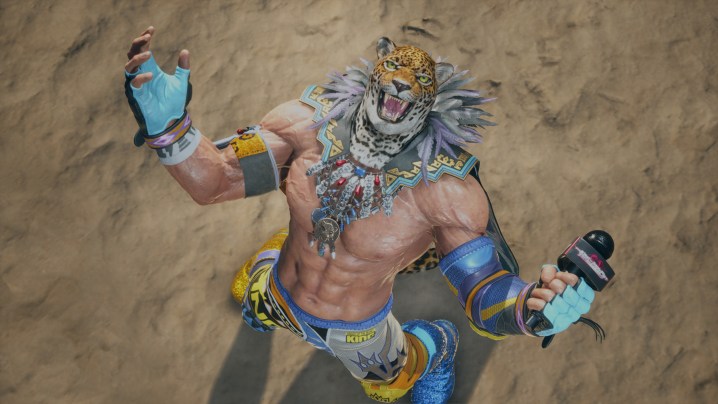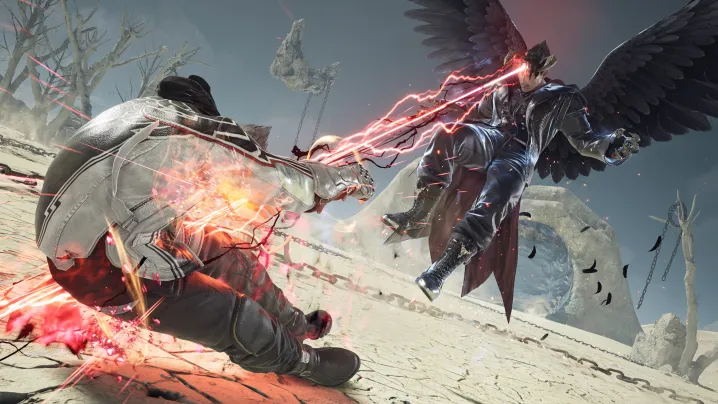Tekken 8 fixes my biggest problem with Mortal Kombat 1
Despite being a gamer my entire life, I’m still relatively new to the fighting game genre. I put countless hours into Super Smash Bros. Melee and Soulcalibur II as a kid, but I’ve otherwise only played series like Street Fighter casually. That means that I’ve missed decades worth of storytelling from a genre that regularly cooks up the wildest soap opera dramas available in gaming.
I’ve only been fully introduced to that world in the last year after diving deep into Street Fighter 6, Mortal Kombat 1, and now Tekken 8. I don’t tend to play any of these games online looking for tense competition. Instead, I spend my time exclusively in single-player story modes. Sometimes that makes for a great time, like in Street Fighter 6‘s excellent World Tour. Other times, I’m left completely battled by something like Mortal Kombat 1‘s lore-heavy story.
After struggling with the latter, I was starting to worry that it was too late for me to get into the genre’s longest-running franchises. Thankfully, Tekken 8 has quelled that fear thanks to its own fantastic story campaign that fixes every complaint I had with Mortal Kombat 1. Whether you’re an old fan or entirely new to the genre, it’s a must-play example of a fighting game story done right.
Patricide party
I came into Tekken 8 knowing absolutely nothing about the series’ story other than the fact that someone throws their dad into a volcano at some point. Bandai Namco seemed to anticipate that players like me might be tuning in this time, so it included video recaps of every major Tekken game in its gallery. That was a godsend right off the bat, as it quickly got me up to speed on Kazuya, the G Corporation, and more in a few short minutes. By the time I fired up Tekken 8‘s story, I had all the details I needed. (Alternately, you can watch Succession‘s Brian Cox recap it all.)
Mortal Kombat 1 doesn’t offer players the same kind of synopsis, and that seems to be by design at first. Its positioned as a full franchise reboot, as the Fire God Liu Kang has fully rebuilt the universe from the ground up. I figured that was all I needed to know before jumping in, but it quickly became clear that I was mistaken. Mortal Kombat 1‘s story is utterly incomprehensible to a newcomer like me. It doles out a convoluted multiverse story that calls back to previous games like Mortal Kombat: Armageddon. After watching it all, I’d be hard-pressed to describe what happened in it.
Tekken 8 is far clearer by comparison and that’s thanks to the very human conflict at its center. It’s the tale of Jin Kazuma looking to take down his father, the power-hungry Kazuya Mishima. A heck of a lot happens between the pair’s showdowns, but the conflict serves as an important anchor. You can miss the finer details of the story, but still walk away knowing how Jin has grown by the end and why it’s important for him to punch his dad in the face.
All of the lore-heavy pieces of the story draw on wider, universal themes to keep the story engaging. You may not understand the long history of the G Corporation, but its easy to pick up how it’s being used to talk about geopolitical power structures. Kazuya plans to take over the world by force; in his mind, the country with the most weapons is the most powerful. He takes that to a sick extreme mid-story when staging a worldwide King of the Iron Fist Tournament with twisted stakes. Each country will send a representative to fight for it. The most powerful country will survive, while the weaker ones will fall. It’s a clear and direct meditation on the role of militarization in global power hierarchies.

And it’s another area where Mortal Kombat 1 is lacking. Any story analysis is likely to spend more time rattling off character names and lore snippets. It’s harder to grasp what, if anything, that all means. It comes off as story for the sake of story, something that’s perfectly fine for bought-in fans, but a tougher sell for anyone new.
Above all else, though, Tekken 8‘s story simply succeeds thanks to one small word: spectacle. Though it’s only a few hours long, the story plays out like a wildly entertaining anime miniseries. Jin and Kazuya’s battles feel larger than life, and one late-game action set piece even reimagines the core brawling as a Dynasty Warriors-esque action game. Every chapter is big, bold, and full of left-field surprises that don’t require previous knowledge of the series to enjoy. Mortal Kombat’s twists, by comparison, heavily rely on players understanding obtuse cameos from the franchise’s history.
That’s not to say that Mortal Kombat 1‘s story doesn’t have its merits. Its an gloriously cheesy kung-fu movie that builds to a thrilling climax. For dedicated fans of the long story, I’m sure its a fitting crescendo. But between that and Tekken 8, only one of those campaigns has turned me into a ongoing fan who will be eager to pick up the series’ next chapter.
The winner of this bout? Tekken 8.
Editors’ Recommendations

Despite being a gamer my entire life, I’m still relatively new to the fighting game genre. I put countless hours into Super Smash Bros. Melee and Soulcalibur II as a kid, but I’ve otherwise only played series like Street Fighter casually. That means that I’ve missed decades worth of storytelling from a genre that regularly cooks up the wildest soap opera dramas available in gaming.
I’ve only been fully introduced to that world in the last year after diving deep into Street Fighter 6, Mortal Kombat 1, and now Tekken 8. I don’t tend to play any of these games online looking for tense competition. Instead, I spend my time exclusively in single-player story modes. Sometimes that makes for a great time, like in Street Fighter 6‘s excellent World Tour. Other times, I’m left completely battled by something like Mortal Kombat 1‘s lore-heavy story.
After struggling with the latter, I was starting to worry that it was too late for me to get into the genre’s longest-running franchises. Thankfully, Tekken 8 has quelled that fear thanks to its own fantastic story campaign that fixes every complaint I had with Mortal Kombat 1. Whether you’re an old fan or entirely new to the genre, it’s a must-play example of a fighting game story done right.
Patricide party
I came into Tekken 8 knowing absolutely nothing about the series’ story other than the fact that someone throws their dad into a volcano at some point. Bandai Namco seemed to anticipate that players like me might be tuning in this time, so it included video recaps of every major Tekken game in its gallery. That was a godsend right off the bat, as it quickly got me up to speed on Kazuya, the G Corporation, and more in a few short minutes. By the time I fired up Tekken 8‘s story, I had all the details I needed. (Alternately, you can watch Succession‘s Brian Cox recap it all.)
Mortal Kombat 1 doesn’t offer players the same kind of synopsis, and that seems to be by design at first. Its positioned as a full franchise reboot, as the Fire God Liu Kang has fully rebuilt the universe from the ground up. I figured that was all I needed to know before jumping in, but it quickly became clear that I was mistaken. Mortal Kombat 1‘s story is utterly incomprehensible to a newcomer like me. It doles out a convoluted multiverse story that calls back to previous games like Mortal Kombat: Armageddon. After watching it all, I’d be hard-pressed to describe what happened in it.
Tekken 8 is far clearer by comparison and that’s thanks to the very human conflict at its center. It’s the tale of Jin Kazuma looking to take down his father, the power-hungry Kazuya Mishima. A heck of a lot happens between the pair’s showdowns, but the conflict serves as an important anchor. You can miss the finer details of the story, but still walk away knowing how Jin has grown by the end and why it’s important for him to punch his dad in the face.
All of the lore-heavy pieces of the story draw on wider, universal themes to keep the story engaging. You may not understand the long history of the G Corporation, but its easy to pick up how it’s being used to talk about geopolitical power structures. Kazuya plans to take over the world by force; in his mind, the country with the most weapons is the most powerful. He takes that to a sick extreme mid-story when staging a worldwide King of the Iron Fist Tournament with twisted stakes. Each country will send a representative to fight for it. The most powerful country will survive, while the weaker ones will fall. It’s a clear and direct meditation on the role of militarization in global power hierarchies.

And it’s another area where Mortal Kombat 1 is lacking. Any story analysis is likely to spend more time rattling off character names and lore snippets. It’s harder to grasp what, if anything, that all means. It comes off as story for the sake of story, something that’s perfectly fine for bought-in fans, but a tougher sell for anyone new.
Above all else, though, Tekken 8‘s story simply succeeds thanks to one small word: spectacle. Though it’s only a few hours long, the story plays out like a wildly entertaining anime miniseries. Jin and Kazuya’s battles feel larger than life, and one late-game action set piece even reimagines the core brawling as a Dynasty Warriors-esque action game. Every chapter is big, bold, and full of left-field surprises that don’t require previous knowledge of the series to enjoy. Mortal Kombat’s twists, by comparison, heavily rely on players understanding obtuse cameos from the franchise’s history.
That’s not to say that Mortal Kombat 1‘s story doesn’t have its merits. Its an gloriously cheesy kung-fu movie that builds to a thrilling climax. For dedicated fans of the long story, I’m sure its a fitting crescendo. But between that and Tekken 8, only one of those campaigns has turned me into a ongoing fan who will be eager to pick up the series’ next chapter.
The winner of this bout? Tekken 8.
Editors’ Recommendations
